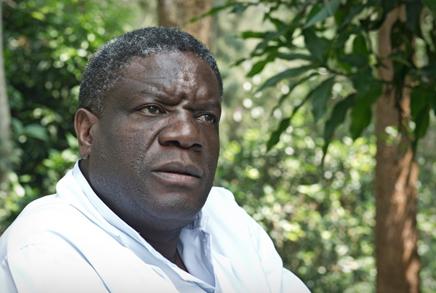A crusading gynaecologist who has been awarded the 2018 Nobel Peace Prize for his work in treating victims of violent rape in the Democratic Republic of Congo (DRC) believes Christians have a responsibility to denounce evil and reject “misogynous theologies.”
If Christians are to maintain the credibility of the gospel in the 21st century, eminent Congolese surgeon Dr Denis Mukwege told a Lutheran assembly last year, they must make the church “a light that still shines in this world of darkness through our struggles for justice, truth, law, freedom – in short, the dignity of man and woman.”
“It is up to us, the heirs of Martin Luther, through God’s word, to exorcise all the macho demons possessing the world so that women who are victims of male barbarity can experience the reign of God in their lives.” — Mukwege
Advocating a Christian understanding of men and women as equal in dignity before God, Dr Mukwege told the Lutheran World Federation in Namibia that “misogynistic theologies” that convey contempt, insult and consequently violence against women must be “corrected and replaced by the theology of women’s esteem.”
“It is up to us, the heirs of Martin Luther, through God’s word, to exorcise all the macho demons possessing the world so that women who are victims of male barbarity can experience the reign of God in their lives,” he said.
Dr Mukwege’s “efforts to end the use of sexual violence as a weapon of war” were honoured at the weekend when the Nobel Committee awarded him the Nobel Peace Prize at the weekend alongside Nadia Murad, a Yazidi activist who was held as a sex slave by ISIS in Iraq.
Nicknamed Dr Miracle for his surgical skill and dedication, Dr Mukwege has treated tens of thousands of women at Panzi Hospital, a Pentecostal hospital in the city of Bukavu, many of whom have sustained appalling injuries from being gang-raped by rebel groups and the Congolese military.
Eastern DR Congo has been racked by more than two decades of conflict, with numerous armed groups battling for control of rich deposits of gold and other precious minerals.
Dr Mukwege told the 12th Lutheran assembly last year those engaged in systematic rapes were using such violence as a weapon of war to achieve goals such as humiliating their adversaries. He urged the international community to draw a “red line” on the use of violence against women in war, as had been done on the use of chemical weapons.
In 2016, Dr Mukwege told NPR (National Public Radio in the US) that rape was a “very deep trauma and women need to regain confidence in themselves.”
Guided by his faith, he cares for his patients holistically, not only treating their bodies but helping them to “fight for their own right, to bring them to be autonomous and, of course, to support them psychologically and all of this is a process of healing so women can regain their dignity.”
Dr Mukwege has faced danger because of his work. A month after he denounced an “unjust war that has used violence against women and rape as a strategy of war” at the UN in 2012, gunmen invaded his home and tried to kill him, his wife and two daughters. His guard intervened and was killed. Soon afterwards he fled Congo but the women of Eastern DRC sold their harvest to pay for him to fly home. Since his return in 2013, he has lived at the hospital under the permanent protection of UN peacekeepers.
Email This Story
Why not send this to a friend?


